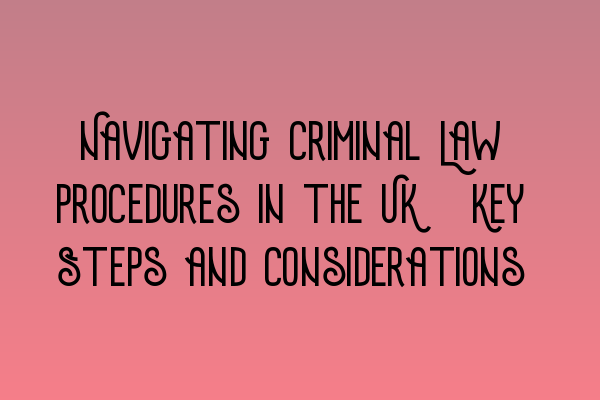Navigating Criminal Law Procedures in the UK: Key Steps and Considerations
When it comes to criminal law procedures in the UK, understanding the key steps and considerations is crucial for anyone involved in or affected by a criminal case. Whether you are a defendant, a victim, or a witness, having a solid grasp of the legal process can help you navigate through the complexities of the criminal justice system.
In this article, we will provide an overview of the essential steps involved in criminal law procedures in the UK and highlight the key considerations that should be kept in mind throughout the process.
1. Arrest and Custody
The first step in any criminal law procedure is often the arrest and custody of a suspect. If you find yourself or someone you know in this situation, it is important to remember your rights. The police must inform you of the reasons for your arrest, provide you with access to legal representation, and explain the next steps of the process.
Related Article: SQE Exam Prep: Essential Study Materials for Aspiring Solicitors
2. Police Investigation
Once arrested, the police will conduct an investigation to gather evidence. This may involve interviewing witnesses, collecting forensic evidence, and examining CCTV footage. If you are a victim or a witness, it is essential to cooperate fully with the police and provide any relevant information to assist in the investigation.
3. Charging Decision
After the police investigation is complete, the Crown Prosecution Service (CPS) will review the evidence and make a charging decision. This decision is based on whether there is sufficient evidence to provide a realistic prospect of conviction and whether it is in the public interest to pursue the case.
4. Court Proceedings
If the CPS decides to proceed with the case, court proceedings will commence. The accused will appear before a court where the charges will be read out, and pleas will be entered. The court will then set a date for the trial and any pre-trial hearings that may be required.
Related Article: Demystifying the Solicitors Qualifying Examination Format
5. Trial and Judgment
The trial is where the evidence is presented, and the guilt or innocence of the accused is determined. The prosecution and defense will have the opportunity to present their cases, call witnesses, and cross-examine the opposition’s witnesses. At the end of the trial, the judge or jury will deliver a verdict. If the accused is found guilty, a sentencing hearing will take place.
6. Sentencing
If the accused is found guilty, a sentencing hearing will be held to determine the appropriate punishment. The judge will consider various factors such as the seriousness of the offense, the defendant’s criminal record, and any mitigating or aggravating circumstances. The aim of sentencing is to ensure justice is served while taking into account the individual circumstances of the case and the defendant.
7. Appeals
If either the prosecution or the defense is unhappy with the outcome of the trial or the sentence imposed, they have the right to appeal. The appeals process allows for a higher court to review the case and determine whether any errors were made that may have affected the outcome. It is important to seek legal advice if considering an appeal as the process can be complex.
Related Article: SQE Exam for International Lawyers: Challenges and Success Strategies
Final Thoughts
Navigating criminal law procedures in the UK can be challenging, but having a clear understanding of the key steps and considerations can make the process more manageable. Whether you are directly involved in a criminal case or seeking information as a concerned citizen, it is vital to seek professional legal advice to ensure your rights are protected and you have the best possible guidance throughout the process.
Related Articles:
